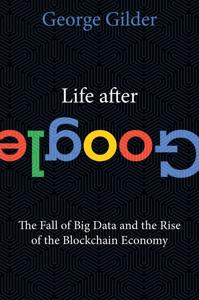
Want to learn the ideas in Life After Google better than ever? Read the world’s #1 book summary of Life After Google by George Gilder here.
Read a brief 1-Page Summary or watch video summaries curated by our expert team. Note: this book guide is not affiliated with or endorsed by the publisher or author, and we always encourage you to purchase and read the full book.
Video Summaries of Life After Google
We’ve scoured the Internet for the very best videos on Life After Google, from high-quality videos summaries to interviews or commentary by George Gilder.
1-Page Summary of Life After Google
Overview
Google has built a centralized hub where individual security is not their priority. However, the cryptocosm and blockchain have enabled individuals to protect their own data in a decentralized manner, which can potentially pull apart Google’s cluttered system of storing data.
There’s no escaping Google.
In the 20 years since it was founded, Google has completely redefined how we interact with the world online. It’s a verb now! But is its tapestry of big data and free access really such a great thing? And will it be able to hold on to its position of power in the future? Because, as it turns out, though Google holds data on almost everyone on the planet, it doesn’t actually keep that data all under proper lock and key. So what will replace Google? This is where cryptocurrencies come in. They focus on security instead of free access.
In this article, you’ll learn about the concept of a Siren Server and why you should not worry about Artificial Intelligence taking over the world. You’ll also find out who Satoshi Nakamoto is or isn’t.
Big Idea #1: Google is a massive company that makes its money from advertising, and it’s also the best at what it does.
Google is the most influential company in our society. It has defined how we interact with technology and one another.
Let’s start with Google’s vision of knowledge. They gather all the information in the world, put it in the cloud, and then analyze it using powerful algorithms to extract new information.
To accomplish this, Google has built a massive database of information that includes the internet and many other things. This database is digitalized versions of real world objects, including books, languages, maps and even faces through facial recognition software. The company wants access to all information so privacy is not allowed in its model.
Google makes most of its revenue through advertising. Instead of paying with money, you pay with your time and attention. Most people don’t want to look at ads, but Google is famous for making them so subtle that they blend in naturally.
Google has built a data center in the town of The Dalles, Oregon. It houses 75,000 servers and processes 3.5 billion searches per day – that’s 1.5 trillion every year!
These servers have allowed Google to expand with web services like Gmail and Google Docs, while also creating a new standard for tech companies. The more storage and processing power you can offer, the better off you are. However, Jaron Lanier argues that these very same centers may be pulling them toward an early grave by giving them too much market dominance.
Big Idea #2: Big data doesn’t have to lead to dangerous AI.
In January 2017, a secret gathering of information technology pioneers took place in Monterey Bay to discuss the risks associated with artificial intelligence. They were led by Google cofounder Larry Page.
Most of the attendees at the conference were actually developing AI in Silicon Valley. They believed that an AI-dominated future is inevitable, so they thought it was more important to be involved and try to keep people informed about its dangers than not develop it at all.
Mathematics has been around for a long time, and it is very important. In 1930, at the conference in his hometown of Königsberg, Germany (present-day Kaliningrad, Russia), David Hilbert presented the idea that everything could be reduced to mathematics. However, on the same day at the same conference Kurt Gödel demonstrated that there can’t be any absolutely complete logical system because you always need an outside authority. This means humans can not only discover systems but also create them too. Computer programming works this way: you define rules from the outside and then program accordingly.





